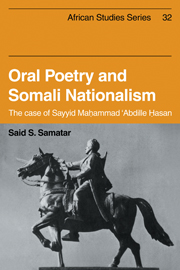Book contents
- Frontmatter
- Contents
- List of illustrations
- List of figures
- List of tables
- Note on transcription of Somali words
- Preface
- Introduction
- 1 Elements of Somali pastoral oratory: Prose
- 2 Elements of Somali pastoral oratory: Poetry
- 3 Occupation and resistance: The rise of the Somali Dervishes
- 4 Poetic oratory and the Dervish movement
- 5 Myth and the Mullah
- Notes
- Select bibliography
- Index
- Titles in the series
2 - Elements of Somali pastoral oratory: Poetry
Published online by Cambridge University Press: 07 May 2010
- Frontmatter
- Contents
- List of illustrations
- List of figures
- List of tables
- Note on transcription of Somali words
- Preface
- Introduction
- 1 Elements of Somali pastoral oratory: Prose
- 2 Elements of Somali pastoral oratory: Poetry
- 3 Occupation and resistance: The rise of the Somali Dervishes
- 4 Poetic oratory and the Dervish movement
- 5 Myth and the Mullah
- Notes
- Select bibliography
- Index
- Titles in the series
Summary
The country teems with ‘poets’ … every man has his recognized position in literature as accurately defined as though he had been reviewed in a century of magazines – the fine ear of this people causing them to take the greatest pleasure in harmonious sounds and poetical expressions, whereas a false quantity or prosaic phrase excites their violent indignation.‥ Every chief in the country must have a panegyric to be sung by his clan, and the great patronize light literature by keeping a poet.
So wrote Richard Burton in the 1850s from the Somali coast of Zeylaʿ in an attempt to share with his countrymen what he thought to be a ‘strange’ phenomenon, namely, that an unwritten language ‘should so abound in poetry and eloquence’. Burton's expression of surprise at finding the unlettered Somalis in possession of developed literature reflects a widespread, if complacent, assumption, especially in the West, that equates literature and literary perfection with writing. Yet contemporary students of literature would tell us that the ‘connection’ between writing and literature is ‘actually accidental’, and belongs ‘only to a secondary phase in the history of literature’.
Burton, however, correctly noted the prominent place occupied by poetry among the pastoral Somalis and his observation has been steadily echoed by many students of Somali culture and language. The Somalis think of their verse as more than just an artistic enterprise whose sole aim is to enlarge the imagination and to inspire men towards the lyrical and the beautiful.
- Type
- Chapter
- Information
- Oral Poetry and Somali NationalismThe Case of Sayid Mahammad 'Abdille Hasan, pp. 55 - 90Publisher: Cambridge University PressPrint publication year: 1982

